Table of Contents
Daily Current Affairs for Government Exams:
Today Current Affairs: 21st January 2020 for UPSC IAS exams, State PSC exams, SSC CGL, State SSC, RRB, Railways, Banking Exam & IBPS, etc.
Contents:
- Global Social Mobility Report
- Global Inequality Crisis Report
- Global Investment Trend Monitor Report
- BERLIN SUMMIT 2020
- 12th National Tribal Youth Exchange Programme
- International Tribunal
- Non-Proliferation Treaty
- Reserve Bank of India (RBI)
- China one-child policy:
- Carbon Disclosure Project
- Other important current affairs
1. Global Social Mobility Report:
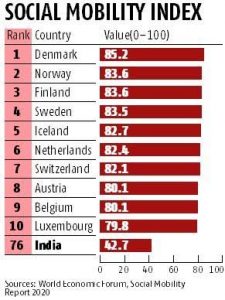
The World Economic Forum has come out with its first-ever Global Social Mobility Report, which has ranked India 76 out of the 82 countries profiled.
- Social mobility is the ability of a child to experience a better life than their parents.
- While relative social mobility is an assessment of the impact of socio-economic background on an individual’s outcomes in life.
Global Social Mobility Index:
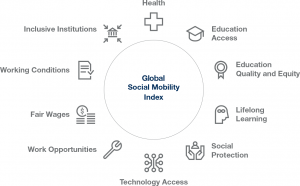
The WEF’s Global Social Mobility Index assesses the 82 economies on “10 pillars” spread across the following five key dimensions of social mobility:
- Health;
- Education (access, quality and equity, lifelong learning);
- Technology;
- Work (opportunities, wages, conditions);
- Protection and Institutions (social protection and inclusive institutions).
2.Global Inequality Crisis Report: Oxfam International:
The report, titled Time to Care: Unpaid and Underpaid Care Work and the Global Inequality Crisis have been released by Oxfam International ahead of the 50th Annual Meeting of the World Economic Forum (WEF).
- The report focuses on the alleviation of global poverty.
- It also states that economic inequality is out of control and has created a great divide in the world.
- This great divide is based on a flawed and sexist economic system that has accumulated vast wealth and power into the hands of a rich few. And they are also exploiting the labor of women and girls, and systematically violating their rights.
Key Points:
- Number of Billionaires: The world had 2,153 billionaires in the world in 2019.
The number of billionaires has doubled in the last decade, despite their combined wealth having declined in 2018. - The concentration of Wealth: The world’s richest 1% have more than twice as much wealth as 6.9 billion people.
- Unpaid Care Work: The monetary value of unpaid care work globally for women aged 15 and over is at least $10.8 trillion annually –three times the size of the world’s tech industry.
Unpaid care work is the ‘hidden engine’ that keeps the wheels of our economies, businesses and societies moving. - Average Wages: From 2011 to 2017, average wages in G7 countries grew 3%, while dividends to wealthy shareholders increased by 31%.
- Taxation: An additional 0.5% tax on the wealth of the richest 1% over the next 10 years can create 117 million jobs in education, health and elderly care.
- Gender Inequality and Distribution of Wealth: Globally, extreme poverty rates are 4% higher for women than men and this gap rises to 22% during women’s peak productive and reproductive ages.
- The minimum annual monetary value of the unpaid care work by women aged 15 and above globally is three times the size of the world’s tech industry.
- Globally, 42% of working-age women are outside the paid labour force, compared with 6% of men, due to unpaid care responsibilities.
- 80% of domestic workers worldwide are women and 90% of domestic workers have no access to social security such as maternity protection and benefits.
Key Points Related to India
- India’s richest 1% hold more than four-times the wealth held by the bottom 70% of the country’s population.
- The combined total wealth of 63 Indian billionaires is higher than the total Union Budget of India for the fiscal year 2018-19 which was at Rs 24,42,200 crore.
3. Global Investment Trend Monitor Report: UNCTAD:

According to the recently released Global Investment Trend Monitor Report by the United Nations Conference on Trade and Development (UNCTAD), India was among the top 10 recipients of Foreign Direct Investments (FDI) in 2019.
Key Highlights
- Global Trend: The global FDI marked a decline of 1% from revised $1.41 trillion ( in 2018) to $1.39 trillion (in 2019).
- This was against the backdrop of weaker macroeconomic performance and policy uncertainty for investors in the midst of ongoing trade tensions.
- Developing economies continued to attract more than half of global FDI flows, whereas, the FDI flows to developed countries decreased further by 6%.
- Despite this, the United States remained the largest recipient of FDI, followed by China and Singapore.
Regional & India: South Asia recorded a 10% increase in FDI and this growth was driven by India marking a 16% increase in FDI inflows. - India attracted $49 billion FDI inflows in 2019 as compared to $42 billion (in 2018). The majority of this went into services industries, including Information Technology.
- Inflows into Bangladesh and Pakistan declined by 6% and 20%, respectively.
- Mergers & Acquisitions: Also, according to the report, cross-border Mergers & Acquisitions (M&As) decreased by 40% in 2019 (the lowest level since 2014). The underlying reasons for this fall were sluggish Eurozone growth and Brexit.
- The fall in global cross-border M&As sales was deepest in the services sector (56% decline), followed by manufacturing (19% decline) and the primary sector (14% decline).
- Future Projections: However, UNCTAD expects FDI flows to rise moderately in 2020, as according to current projections, the global economy is set to improve from its weakest performance since the global financial crisis in 2009.
4. BERLIN SUMMIT, 2020:
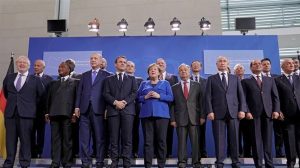
German Chancellor Angela Merkel hosted a summit at Berlin bringing together backers of the main warring factions in Libya as the latest of many diplomatic attempts aimed at pushing Libya on a path to peace.
- World leaders committed to ending all foreign meddling in Libya’s war and to uphold a weapons embargo as part of a broader plan to end the spiraling conflict.
- The presidents of Russia, Turkey and France were among global chiefs signing up to the plan to stop interfering in the war. This includes weapons, troops or financing.
- But the talks failed to deliver serious dialogue between the warring parties — strongman Khalifa Haftar and the head of Tripoli’s UN-recognised government Fayez al-Sarraj. It also failed to get both sides to sign up to a permanent truce.
- Libya has been torn by fighting between rival armed factions since a 2011 NATO-backed uprising killed dictator Moamer Kadhafi.
5.The 12th National Tribal Youth Exchange Programme:
The 12th National Tribal Youth Exchange Programme was inaugurated in Puducherry under which tribal youths will be visiting many places to know about the language, customs, culture, arts, dressing patterns, food pattern and other aspects of Puducherry.
- Bodies involved: Nehru Yuva Kendra Sangathan (NYKS) organizes Tribal Youth Exchange Programme with the support of the Ministry of Home Affairs, Govt. of India.
- Objective: To provide an opportunity to the tribal youth to understand the cultural ethos, language, lifestyles of the people depicting Socio-economic & Cultural Development & Development process unity in diversity aspects of our national life.
- The first program was held in 2006.
6. International Tribunal Rejects Claims Against India:

The Government of India in its recent press release has announced that the International Arbitration Tribunal has dismissed all claims against India in entirety in relation to cancellation of Letters of Intent for providing 2G services.
- The verdict was pronounced last year in July 2019 by the International Arbitration Tribunal constituted in accordance with the United Nations Commission on International Trade Law (UNCITRAL) Arbitration Rules, 1976.
- The proceedings were administered by the Permanent Court of Arbitration (PCA).
- Parties Involved: The claims were filed by Tenoch Holdings Limited (Cyprus), Mr Maxim Naumchenko (Russian Federation) and Mr Andrey Poluektov (Russian Federation) against India under the Bilateral Investment Treaties with Cyprus and Russian Federation.
- Bilateral Investment Treaties between two countries allow a private investor to initiate dispute arbitration proceedings against the government to protect its investments.
- Underlying Reason: The arbitration arose out of the cancellation of Letters of Intent for the issuance of telecommunications licenses to provide 2G services in five telecommunications circles in India, inter alia, for India’s essential security interests.
- Agreements: The arbitration was carried out in accordance with the Agreement signed between:
- Government of the Russian Federation and the Government of the Republic of India for the Promotion and Mutual Protection of Investments, and
- Government of India and the Government of the Republic of Cyprus for the Mutual Promotion and Protection of Investments.
7. Iran has warned to withdraw from the Non-Proliferation Treaty (NPT):
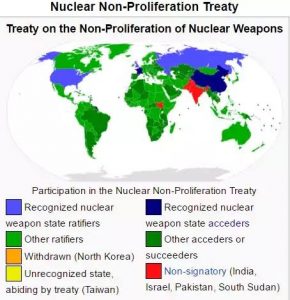
Iran has warned to withdraw from the Non-Proliferation Treaty (NPT) if the European Nations refer the dispute over its atomic program to the United Nations Security Council.
- Iran had signed the Joint Comprehensive Plan of Action (JCPoA) with US, UK, France, Germany, Russia, and China in 2015 that had offered it access to global trade in return for accepting curbs to its atomic program.
- In 2018, the US unilaterally pulled out the pact and reimposed sanctions on Iran.
- Recently, the top Iranian general Qassem Soleimani (the commander of the Al-Quds Force of Iran’s Islamic Revolutionary Guard Corps, IRGC) was assassinated by the US during his visit to Iraq.
- This has escalated tensions in the international arena.
- Amid rising tensions, Britain, France, and Germany declared that Iran was violating the 2015 pact and have launched a dispute mechanism that could eventually see the matter referred back to the Security Council and the reimposition of U.N. sanctions.
Non-Proliferation Treaty (NPT)
- The NPT is an international treaty whose objective is to prevent the spread of nuclear weapons and weapons technology, to foster the peaceful uses of nuclear energy, and to further the goal of disarmament.
- The treaty was signed in 1968 and entered into force in 1970. Presently, it has 190 member states.
- It requires countries to give up any present or future plans to build nuclear weapons in return for access to peaceful uses of nuclear energy.
- It represents the only binding commitment in a multilateral treaty to the goal of disarmament by the nuclear-weapon States.
- Nuclear-weapon states parties under the NPT are defined as those that manufactured and exploded a nuclear weapon or other nuclear explosive devices before January 1, 1967.
India’s Stand on NPT:
- India is one of the only five countries that either did not sign the NPT or signed but withdrew later, thus becoming part of a list that includes Pakistan, Israel, North Korea, and South Sudan.
- India always considered the NPT as discriminatory and had refused to sign it.
- India has opposed the international treaties aimed at non-proliferation since they were selectively applicable to the non-nuclear powers and legitimized the monopoly of the five nuclear weapons powers.
8. Central bank’s transparency initiative.:
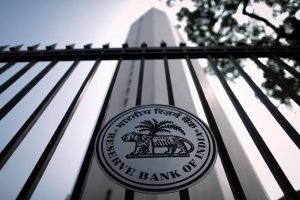
Reserve Bank of India (RBI) has released the minutes of the 579th meeting of the Central Board of Directors for the first time as part of the central bank’s transparency initiative.
- The disclosure of the information is considered as a measure to enhance public awareness about the functioning of the RBI.
- The minutes of the meetings of the Central Board will be uploaded on the RBI’s website under provisions of Section 4 of the Right to Information (RTI) Act.
- Section 4 of the RTI Act requires suo-moto disclosure of information by each public authority.
- So far, the regulator only shared the minutes of board meetings in response to queries under the RTI Act.
In future, the minutes will be placed on the RBI website within two weeks from the date of its confirmation in the next meeting of the Central Board and on being signed by the chairman in the same meeting.
9. China’s one-child policy:
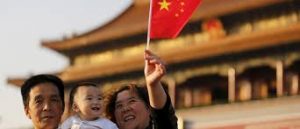
- The birth rate in China has fallen to the lowest in 70 years.
- The birth rate in 2019 was at 10.48 per 1,000, the lowest since 1949.
- The number of babies born in 2019 fell by over 580,000 to 14.65 million.
- This fall in birth rate can be largely attributed to China’s one-child policy, which came into force in 1979 under then-leader Deng Xiaoping.
- It was adopted out of the Malthusian fears that unchecked population growth would lead to economic and environmental catastrophe. It was also a response to concerns about food shortages.
What is Malthusian theory all about?
- Thomas Robert Malthus was the first economist to propose a systematic theory of population.
- He articulated his views regarding the population in his famous book, Essay on the Principle of Population (1798), for which he collected empirical data to support his thesis.
- He argued that if left unchecked, a population will outgrow its resources, leading to a host of problems.
10.Carbon Disclosure Project:

The Carbon Disclosure Project, an annual report on carbon reduction activities of different countries and their firms was released by a non-profit organization Global Reporting Initiative.
- According to the report, the countries were ranked based on their corporate responsibilities of carbon reduction. In order to assess the role played by them, their science-based targets were weighed.
- According to the report, 58 Indian companies disclosed their environment-related activities to the organization. Based on their disclosure, the report concludes that 98% of the top Indian companies have now formed committees to address climate-related issues. The change has been witnessed between 2018 and 2019.
- The United States topped the list with 135 companies being transparent in their disclosure. Followed by US, Japan ranked second with 83 companies.
- On the third, fourth and fifth ranks were UK (78), France (51) and India (38) respectively.
- The report said that over 6,900 companies have so far disclosed their data through the Carbon Disclosure Project.
- This contributes to 55% of world capitalization
Other important current affairs:
1. The Ministry of Law and Justice issued an Extraordinary Gazette Notification, declaring the United Arab Emirates to be a “reciprocating territory” under Section 44A of the CPC, 1908.
- The notification also declared a list of courts in the UAE to be “superior Courts” under the same section. Reciprocating territory: Essentially, orders passed by certain designated courts from a ‘reciprocating territory’ can be implemented in India, by filing a copy of the decree concerned in a District Court here.
- The courts so designated are called ‘superior Courts’.Other countries declared to be “reciprocating territories” are: United Kingdom, Singapore, Bangladesh, Malaysia, Trinidad & Tobago, New Zealand, the Cook Islands (including Niue) and the Trust Territories of Western Samoa, Hong Kong, Papua New Guinea, Fiji, Aden
2.XENOBOT:
- Scientists in the United States have created the world’s first “living machines” — tiny robots built from the cells of the African clawed frog, that can move around on their own.
- They have named the millimeter-wide robots “xenobots” — after the species of aquatic frog found across sub-Saharan Africa from Nigeria and Sudan to South Africa, Xenopus laevis.
- The xenobots “can move toward a target, perhaps pick up a payload (like medicine that needs to be carried to a specific place inside a patient) — and heal themselves after being cut.
- The “novel living machines” were “neither a traditional robot nor a known species of animal”, but “a new class of artefact: a living, programmable organism”.
3. The Prime Minister Narendra Modi and his Nepali counterpart K P Sharma Oli inaugurated Integrated Check Post (ICP) at Biratnagar.
- Jobgani-Biratnagar international trade point is one of the important trade points between the two countries. Biratnagar is also the third-largest Revenue Collecting Customs Office of Nepal.
- ICP Biratnagar has the facilities for immigration clearance of foreign passengers, export and import cargo handling. It is designed to handle around 500 trucks per day.
- India has traditionally been Nepal’s largest trading partner. Presently, over 65 percent of Nepal’s trade is with India and also over 65 percent of Nepal’s exports are to India.
4. Recently, the Maharashtra government announced that it would grant Rs 100 crore for the development of Pathri as a center of religious tourism and “the birthplace of Sai Baba”.
- This has triggered anger in Shirdi, the town synonymous with the saint. Pathri is a town and a municipal council in Parbhani district, Maharashtra.
- Several authoritative, popular works on Baba either directly mention Pathri as his possible birthplace or speculate that he may have been from that area.
5. Punjab Mandi Board (PMB) had recently organized awareness camps, training programs and seminars on the National Agriculture Market (e-NAM) across mandis in the state.
- E-NAM (National Agriculture Market) is an online trading platform for agriculture produce aiming to help farmers, traders, and buyers with online trading and getting a better price by smooth marketing.
- It was launched by the Centre in 2015 and the government had to extend it in a phased manner across the 585 mandis of the country by December 31, 2019.
6. The Department of Industry and Internal Trade (DPIIT) announced that it has launched a paperless licensing process for petroleum service stations.
- The paperless licensing has been launched under Petroleum Rules, 2002. The implementing agency of the order would be the Petroleum and Explosives Safety Organization (PESO).
7. The 2nd edition of NIC Tech Conclave-2020 will be inaugurated by the Union Minister Ravi Shankar Prasad today.
- The conclave is being organized by National Informatics Centre at Pravasi Bhartiya Kendra, New Delhi.
- This Conclave will contribute immensely to the capacity building of Government officers across the country.
- This year’s theme is Technologies for Next-Gen Governance.
8. Australia conferred its highest civilian honor, the Order of Australia honor, on Kiran Mazumdar-Shaw for her contribution towards advancing the country’s relationship with India.
- An alumnus of Federation University Australia, Mazumdar-Shaw is the founder of Biocon, a biopharma company.
9. 1st woman 3rd umpire in men’s internationals
- Jacqueline Williams of the West Indies will become the first woman to officiate as the third umpire in a men’s international.
- She will be an umpire for the first of three T20Is against the visiting Ireland team.
- The 43-year-old Williams oversaw all 3 matches of the Twenty20 International (T20I) series in Grenada, West Indies between West Indies and Ireland.
10. Deepika Padukone received the Crystal Award 2020
- The 26th Annual Crystal Award for the year 2020 by the World Economic Forum (WEF) has been awarded to Deepika Padukone.
- Deepika Padukone was honored for her contribution to the field of mental health.
- The award was organized ate World Economic Forum in Davos.
- The Crystal Awards recognizes as well as celebrates the achievements of leading artists and cultural figures whose leadership inspires inclusive and sustainable change.




